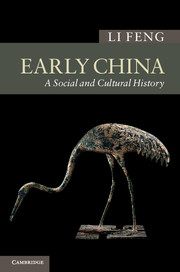Book contents
- Frontmatter
- Contents
- List of Figures
- List of Maps
- Preface
- Chronology of Early China
- Map
- 1 Introduction: Early China and its natural and cultural demarcations
- 2 The development of complex society in China
- 3 Erlitou and Erligang: early state expansion
- 4 Anyang and beyond: Shang and contemporary Bronze Age cultures
- 5 Cracking the secret bones: literacy and society in late Shang
- 6 The inscribed history: the Western Zhou state and its bronze vessels
- 7 The creation of paradigm: Zhou bureaucracy and social institutions
- 8 Hegemons and warriors: social transformation of the Spring and Autumn period (770–481 BC)
- 9 The age of territorial states: Warring States politics and institutions (480–221 BC)
- 10 Philosophers as statesmen: in the light of recently discovered texts
- 11 The Qin unification and Qin Empire: who were the terracotta warriors?
- 12 Expansion and political transition of the Han Empire
- 13 State and society: bureaucracy and social orders under the Han Empire
- 14 Ideological changes and their reflections in Han culture and Han art
- Index
- References
6 - The inscribed history: the Western Zhou state and its bronze vessels
Published online by Cambridge University Press: 05 June 2014
- Frontmatter
- Contents
- List of Figures
- List of Maps
- Preface
- Chronology of Early China
- Map
- 1 Introduction: Early China and its natural and cultural demarcations
- 2 The development of complex society in China
- 3 Erlitou and Erligang: early state expansion
- 4 Anyang and beyond: Shang and contemporary Bronze Age cultures
- 5 Cracking the secret bones: literacy and society in late Shang
- 6 The inscribed history: the Western Zhou state and its bronze vessels
- 7 The creation of paradigm: Zhou bureaucracy and social institutions
- 8 Hegemons and warriors: social transformation of the Spring and Autumn period (770–481 BC)
- 9 The age of territorial states: Warring States politics and institutions (480–221 BC)
- 10 Philosophers as statesmen: in the light of recently discovered texts
- 11 The Qin unification and Qin Empire: who were the terracotta warriors?
- 12 Expansion and political transition of the Han Empire
- 13 State and society: bureaucracy and social orders under the Han Empire
- 14 Ideological changes and their reflections in Han culture and Han art
- Index
- References
Summary
The Zhou Dynasty occupies a special position in the cultural and political history of China, being held in high esteem as the paradigm of political perfection and social harmony in the long Confucian tradition. In some way the reputation was well earned because there was no another civilization (such as that of the Shang) that separated the Zhou Dynasty from the well-documented early imperial times; on the contrary, the Zhou Dynasty created a social and cultural context in which, particularly because of the decline of the Zhou royal order, the embryo of the imperial system grew, and in which all the founding figures of Chinese philosophy lived. On the other hand, the Zhou Dynasty can be seen as a period in which the value of literary culture had been fully explored and appreciated, thus allowing us the opportunity to analyze its political and social institutions in a more coherent way than is possible for the Shang Dynasty on the basis of the contemporary written evidence. It was also a period during which the key to bureaucratic administration was discovered and the concept of the state had become differentiated from that of the royalty.
The Search for Pre-Dynastic Zhou
The question of whether there were a people called by the name “Zhou” before the Zhou conquest of Shang would seem quite superfluous if not contradictory. However, in the 1970s–1980s studies of the various “pre-” or “proto-” dynastic cultures of the regimes that once ruled a large part of China, e.g. Shang, Zhou, and Qin, formed an important stream in Chinese archaeology. Underlying these studies was the methodological assumption that the prehistory of a dynasty can be sought in the archaeological records and, by virtue of its identification with a material culture, the origin of that prehistory can be traced farther back to a time that was beyond what the often ambiguous textual records purport to tell.
- Type
- Chapter
- Information
- Early ChinaA Social and Cultural History, pp. 112 - 138Publisher: Cambridge University PressPrint publication year: 2013



